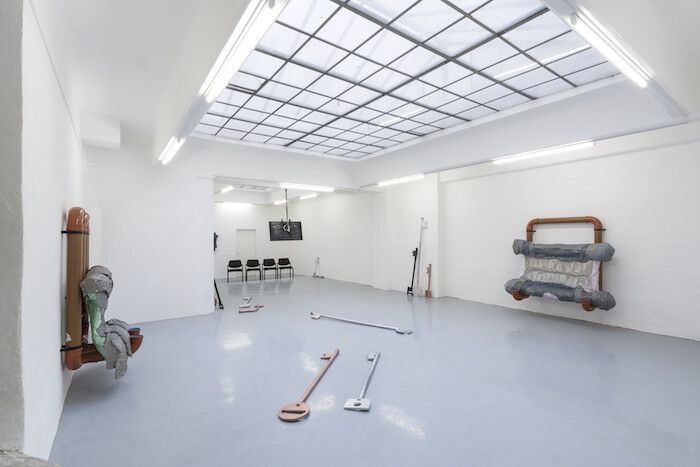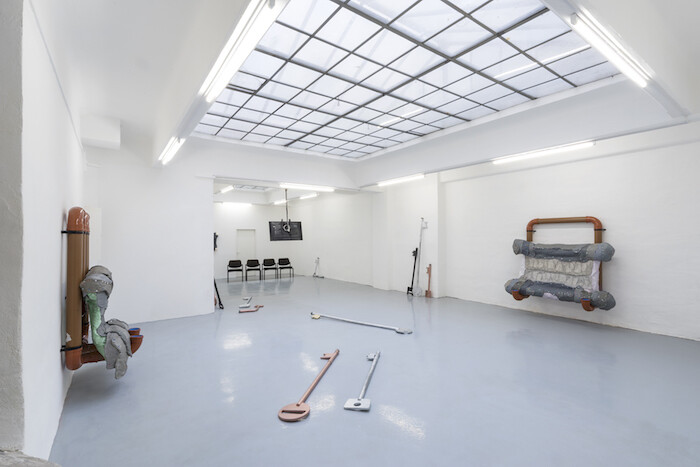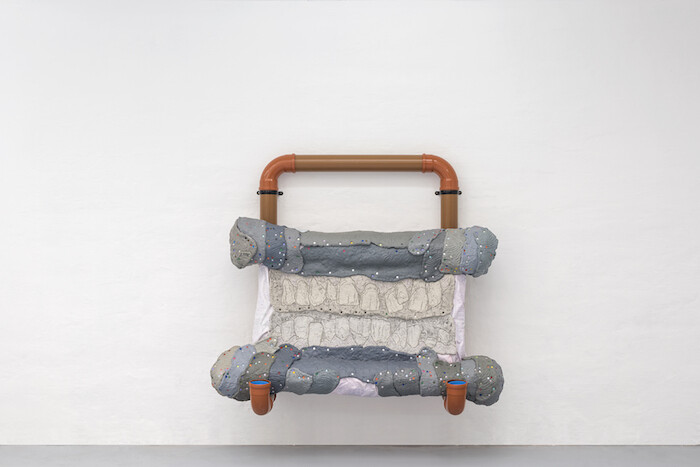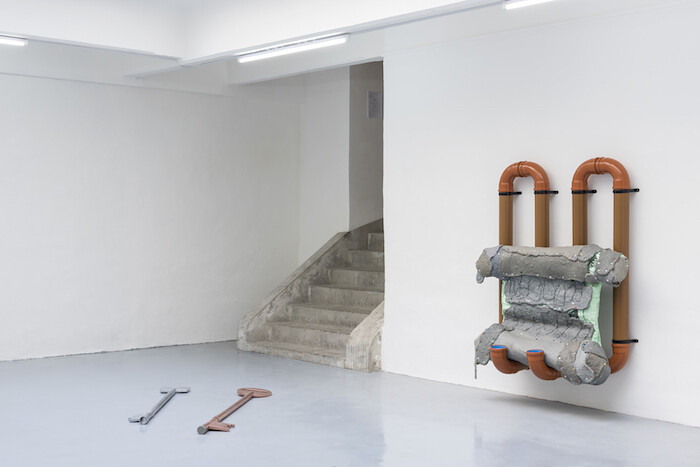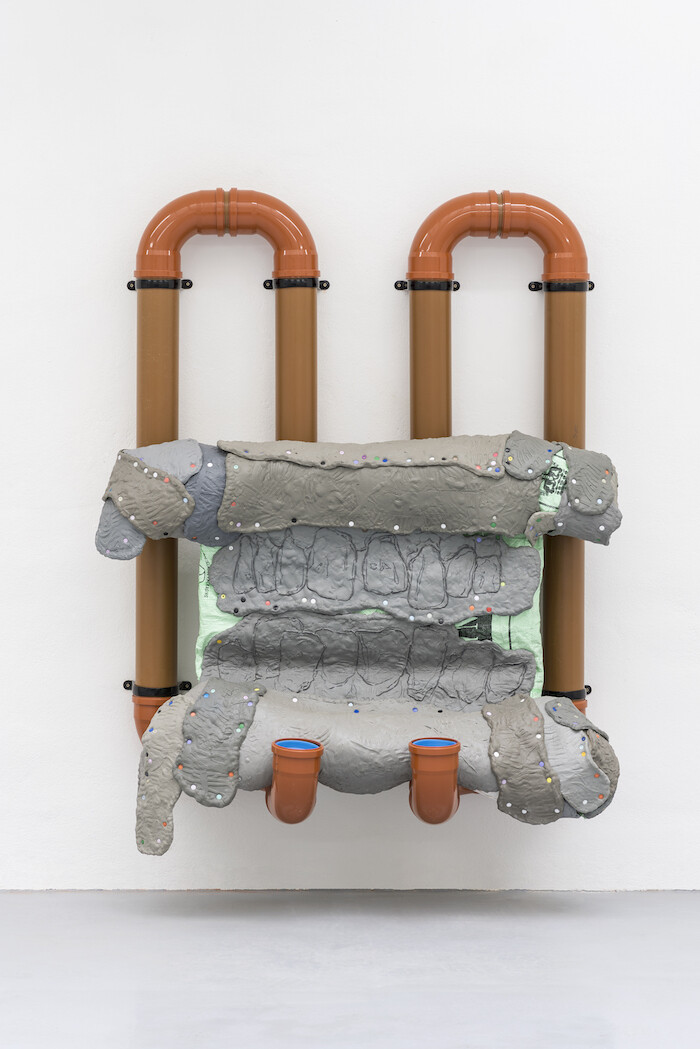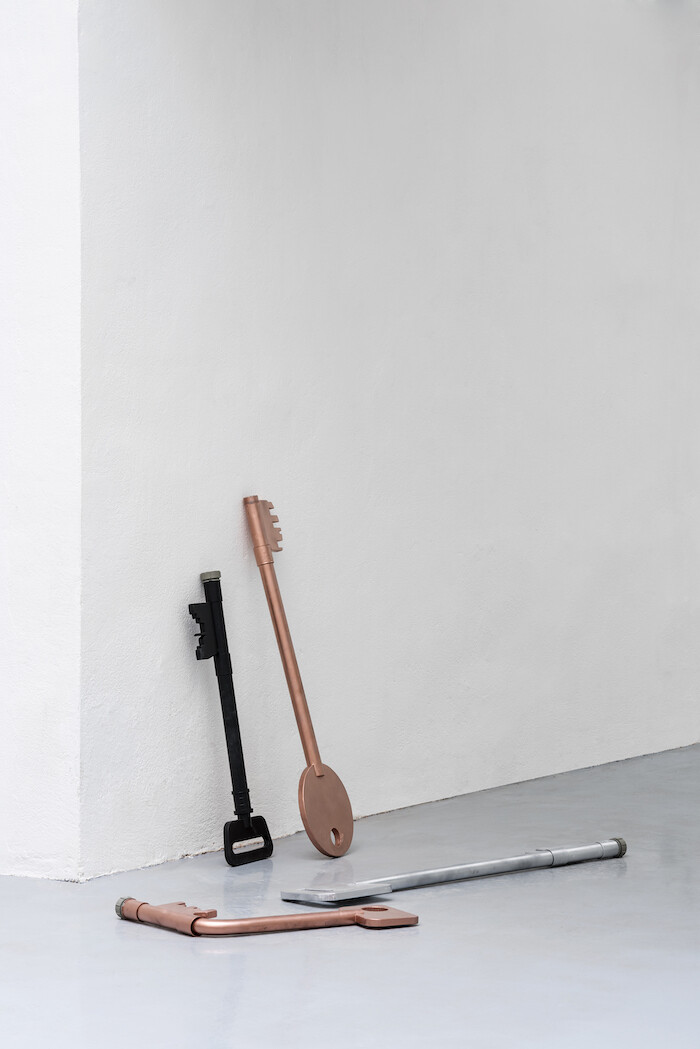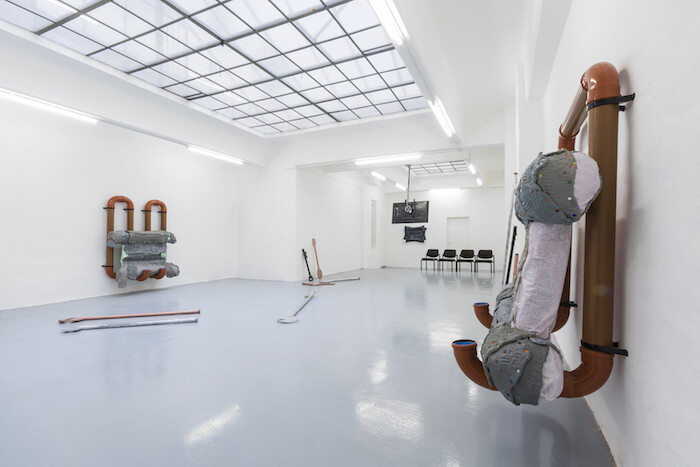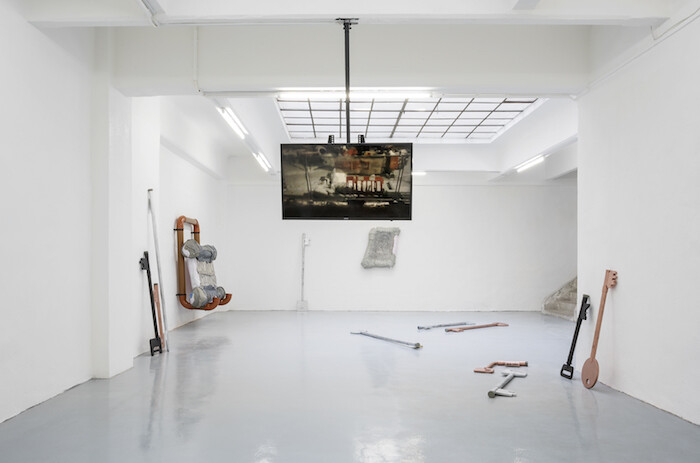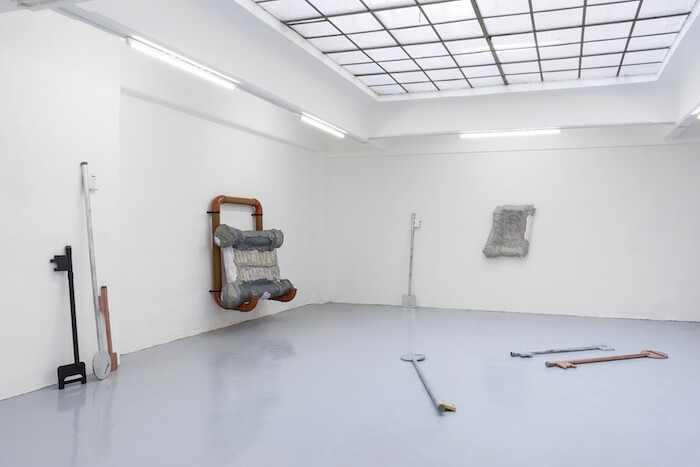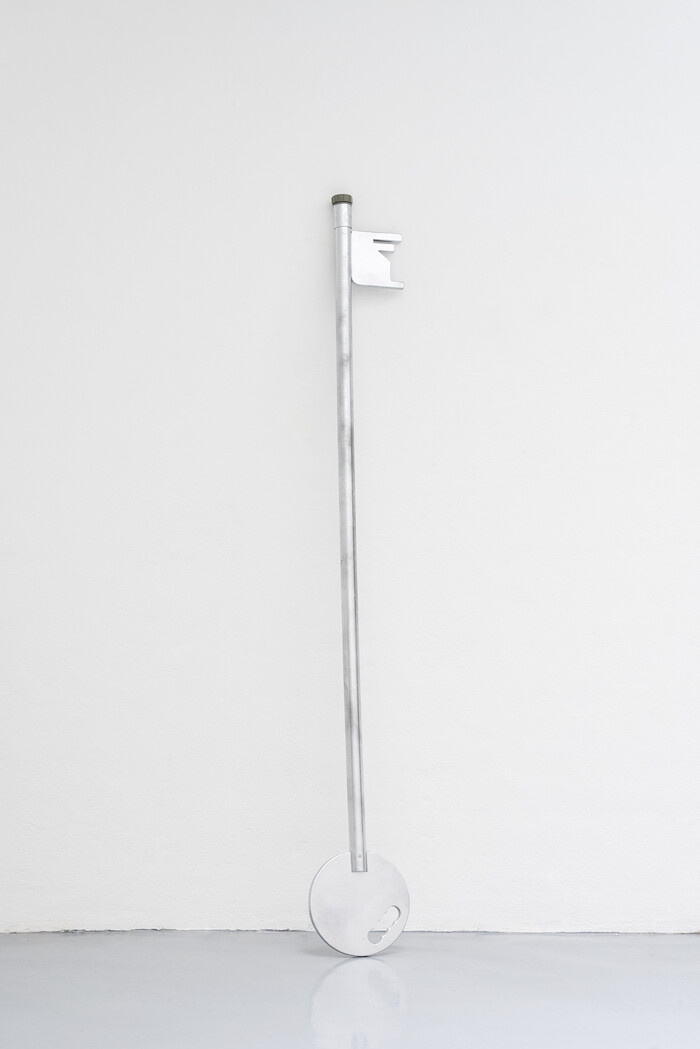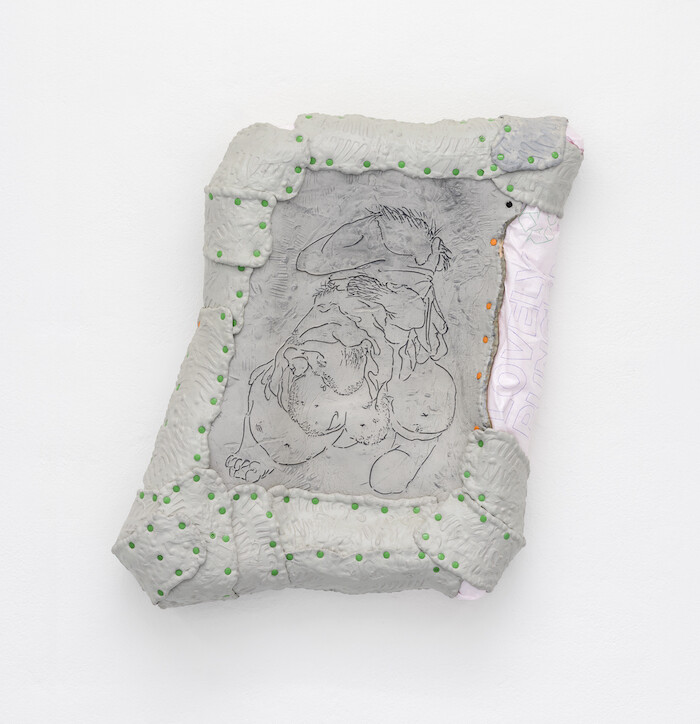Procrustean—what does the word even mean? In Greek mythology, Procrustes was the son of Poseidon, and a thief who tortured his victims by making them lie on an iron bed. If their bodies were too long, he’d cut off the oversized bits; too short, he’d stretch their limbs to fit. Both procedures were fatal, and, Goldilocks-style, few victims fit the bed. “Procrustean bed,” the idiomatic phrase in which the word is most often used, denotes an arbitrary and brutal standard.
Yet conformity—aesthetic, thematic, or otherwise—is not what a visitor gets from Welsh artist Sebastian Jefford’s exhibition in Gianni Manhattan, a skylit, subterranean space in Vienna’s third district, open since January 2017 and arguably the most daring and international of the city’s crop of new galleries. Hung on the wall beside the downward metal ramp leading into the gallery is Aggressively Indeterminate Biscuit (all works 2018). It’s arresting enough to make me stop.
The core of the sculpture appears to be a flattened cardboard box, overlaid at its edges with thick, bulbous protrusions clad in patchworked sheets of gray polyurethane foam, their surfaces indented with what appear to be shoeprints and studded with the colorful, plastic snap-fasteners found on jaunty sportswear. On the central panel is a drawing, cut into another slab of clay-like polyurethane, whose clean, economical lines evoke nineteenth-century Japanese Ukiyo-e art. But the imagery is off. Rather than a famous actor or idealized woman, a headless figure with an enormous foot and a hairy paw sits in front of a window amid clouds, buried in folds of fabric.
In the main space are four more wall sculptures. Two of them—Borboygmatic hearsay and Sometimes I can’t tell if you’re my world or my Wilson—are propped on piping that looks as if it were once linked to infrastructure, recalling the oppressive pipes that appear in the slapstick dystopia of Terry Gilliam’s film Brazil (1985). These, too, are etched drawings—but instead of figures are stylized, imperfect teeth set into upper and lower jaws that look immovable, unable to chew or speak. Placed on the floor and propped against the wall are sculptures in the shape of giant keys, collectively titled Buried Earth Motors. At first, they seem to be cast metal. A closer look reveals them to be made, in part, from painted construction piping.
Born in 1991, Jeffords graduated last year from London’s Royal Academy Schools. His sculptures echo certain postinternet tropes of his generation—like the cartoonish insider references, such as the Looney Tunes Tasmanian Devil, drawn onto one sculpture’s swollen corner. Yet what’s most notable about this show is its madly mixed materiality, which struck even me, and I sit soundly on the older end of Generation X.
The wall sculptures are especially haptic: their human traces, curves, and layers make it difficult to not touch them. (Jefford has said his intention is to create tantalizingly tactile objects—and yes, I quickly touched a piece when the gallerist wasn’t watching.) There’s a levity, an absurdity, to Jefford’s choices of materials and subjects (colorful snaps? crooked teeth?), but the show is contrastingly spare and elegant. The sculptures’ layers, meanwhile, evoke an extended temporal frame, as if each were added slowly like a layer of sediment or a preserved footprint on the moon.
Speaking of time, the 28-minute video In the City—shot on an iPhone and produced in two weeks—describes a fictional city in which a citizen has to have witnessed a building’s construction in order to enter it. If not, the building must be demolished and reconstructed: a civil rebellion ultimately ensues. On a flatscreen suspended by a pole from the ceiling, a droning, computerized voice recites the eerie lines of the titular short story, written by the artist, over shadowy, nocturnal urban scenes shot from the elevated vantage of a surveillance camera. It’s a comment on overregulation, but also our ignorance of the multiple pasts we occupy; a speculation on what we know in the present, what we choose not to know, and what knows us—and, maybe, on future revolution.
Here we return to the title. “Procrustean Flatulence” may be a musing on how time, human regulations, and the limitations of our built environment exert conformity that we ignore or fail to consider. These things, one could say, metaphorically amputate our dangling limbs, or force us to consume predetermined ideas and images within preset interfaces and infrastructures. What we can do in our Procrustean bed of a world but deconstruct, reconstruct, remix, rebel and, uh… fart? What is flatulence but the release of internal pressure? This might be where the bronze, silver, and black keys—a motif of Jefford’s earlier work—come in. Historically and across cultures, keys have symbolized authority, but also liberation. Which keys we carry, and what we unlock with them, is up to us.
